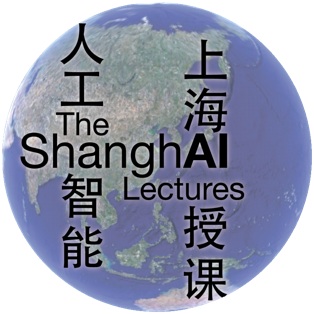
Robohub.org
ShanghAI Lectures 2013 Edition: Live webcast on Thursday, 09:30 CET
 If you have been following the ShanghAI Lectures, you will not want to miss the live webcast of the final 2013 lecture this Thursday starting at 9:30 CET. Rolf Pfeifer (University of Zurich) will explain why a mind needs a body, Manuela Veloso (Carnegie Mellon University) will explain how humans may help robots for mutual benefit, and W. Chen, Shanghai Jiao Tong, Vincent Mueller (ATC and University of Oxford), Rolf Pfeifer, Manuela Veloso and Vera Zabotkina (Russian State University for the Humanities) will discuss if embodiment is really a must for AI and the future of education on natural and artificial intelligence (we think you should study them together, actually).
If you have been following the ShanghAI Lectures, you will not want to miss the live webcast of the final 2013 lecture this Thursday starting at 9:30 CET. Rolf Pfeifer (University of Zurich) will explain why a mind needs a body, Manuela Veloso (Carnegie Mellon University) will explain how humans may help robots for mutual benefit, and W. Chen, Shanghai Jiao Tong, Vincent Mueller (ATC and University of Oxford), Rolf Pfeifer, Manuela Veloso and Vera Zabotkina (Russian State University for the Humanities) will discuss if embodiment is really a must for AI and the future of education on natural and artificial intelligence (we think you should study them together, actually).
In the next coming weeks we will release all the lectures of the 2013 Edition, including remarks and insights. Don’t miss them!
Watch Thursday’s live stream here …
https://arcamm.uc3m.es/arcamm/uc3mtv/directo.php?ID=16
Agenda (all times in CET)
December 19th 2013
Lecture 10 : Future Trends
09:30 Fabio Bonsignorio: Welcome and introduction
09:35 Rolf Pfeifer:
How the body shapes the way we think – principles and insights
10:25 Manuela Veloso: Autonomous Service Robots that Can Ask for Help
11:00 Break
11:10 Panel: W.Chen, V.Mueller, R.Pfeifer, M.Veloso, V.Zabotkina
11:10 Panel: Q1: Does AI need embodiment?
11:40 Panel: Q2: The future of the ShanghAI lectures and education on natural and artificial intelligence
12:10 Good bye! See you in 2014!
About the ShanghAI Lectures
While in the classical approach “intelligence” was essentially viewed as information processing taking place in the brain, the more recent insight that interaction with the environment is of central importance is gaining acceptance. This has led to the metaphor of embodiment, i.e., that intelligence is always a property of an entire organism — an idea that has far-reaching implications and often leads to surprising insights, but which has not so far been widely exploited in industry practice.
This year I coordinated the lectures, with a remarkable help from Prof. Rolf Pfeifer and Dr. Nathan Labhart at the University of Zurich . Me and Rolf Pfeifer will provide the context (introduction, moderation, and conclusion). As always, there are 2-3 invited guest lectures each week.
The 2013 edition presented guest lectures by some of the frontier researchers on natural and artificial intelligence, including a glimpse at artificial and synthetic life:
- Minoru Asada (Osaka University)
- Josh Bongard (University of Vermont)
- Angelo Cangelosi (Universty of Plymouth)
- Luisa Damiano (University of Bergamo)
- Tamar Flash (Weizmann Institute)
- Helmut Hauser (University of Zurich)
- Danica Kragic (KTH)
- Yasuo Kuniyoshi (University of Tokyo)
- Pedro Lima (IST Lisbon)
- Luigi Luisi (Roma Tre University)
- Giorgio Metta (IIT)
- Vincent Mueller (Anatolia College and Oxford University)
- Kevin O’Regan (Paris Descartes/CNRS/ENS)
- Bram Vanderborght (Vrije Universiteit Brussel)
- Manuela Veloso (CMU)
- Hector Zenil (Karolinska Institutet)
The ShanghAI Lectures project aims to:
- Build a sustainable community of students and researchers in the area of Embodied Intelligence
- Make education and knowledge on cutting-edge scientific topics accessible to everyone
- Explore novel methods of knowledge transfer
- Overcome the complexity of a multi-cultural and interdisciplinary learning context
- Bring global teaching to a new level
These lectures about Natural and Artificial Intelligence are held via videoconference at the University Carlos III of Madrid in Spain, the University of Zurich in Switzerland, Scuola Superiore Sant’Anna of Pisa, Italy, Humboldt University Berlin in Germany, University of Plymouth and University of Salford in the UK, and 10 other universities around the globe. Students from the participating universities work together on the exercises, using Webots by Cyberbotics, and Ludobots by the University of Vermont.
They differ from ‘conventional’ MOOCs as they exploit telecommunication technology to build a global lecture hall that allows rich interaction rather than simply implementing the good old fashioned TV broadcasting model on a different medium. They also differ from other AI courses as they propose a new paradigm approach to embodied cognition (a.k.a. AI and Robotics). It is a kind of Copernican revolution with respect to GOFAI and its robotics application — and thus a research program for the coming decades.
tags: Algorithm AI-Cognition, ShanghAI Lectures 2013





